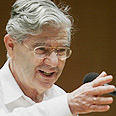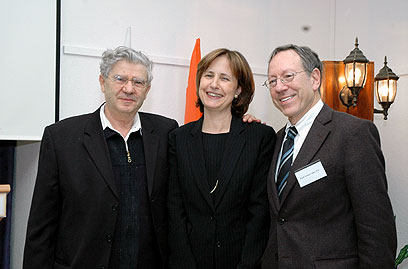
Aharon Barak: I'm not a post-Zionist
Retiring High Court Justice Aharon Barak answers critics a fortnight after issuing his final ruling: 'I am not a post-Zionist, but a Zionist with every fiber of my being'
Two weeks after stepping down as President of the High Court of Justice, Aharon Barak allowed himself on Thursday to respond to the criticism directed at him throughout his tenure and especially after ruling that Palestinians can sue the state of Israel for damages. Speaking before a conference audience at the Bar Ilan University in Tel Aviv Barak told the crowd: "It is important for me to state in this university that I am not a post-Zionist, but a Zionist with every fiber of my being."
Conference-goers said that Barak's emotional statements came after other conference speakers excoriated the former Justice. "I have always believed that criticism is welcome," said Barak, "but not disparaging criticism. Criticism that comes from understanding, the kind that stems from understanding, that means to better the situation."
"This is the criticism I have always longed for all these years. I have never claimed that everything that I have ever thought or written is the absolute truth. I have always accepted criticism; I have listened to it and have been convinced by it."

Aharon Barak with Prof. Yafa Zilbershatz, dean of the Faculty of Law at Bar-Ilan and former Canadian Minister of Justice Irwin Cotler (Photo: Meshulam Levi)
Barak recalled his days as a young boy in the Lithuanian Kovno Ghetto: "I have my own story and that story is not a post-Zionist one. My story is a Zionist tale and it is a story of human dignity, of human rights. I learned a double lesson: one lesson is Zionism – the existence of the state of Israel. If we had had a country then, it (the Holocaust) would not have happened. Therefore this country is dear to me and imperative to me. The security of this country is as important to me as it is to all those Israelis who are more right-winged than I. The existence of this country is the key to the existence of the Jewish people. And therefore I am not a post-Zionist."
"But I have also learned another lesson: the Germans tried to turn out humanity to ashes. My top priority is to the rights of every human and the rights of every minority. The dignity of every man born under God is very very dear to me."
The True Zionism
Barak continually reiterated: "The law is a part of our national security. I am very sorry but this is not post-Zionism. These two entities – the security of Israel on the one hand and human rights on the other - do not contradict each other in my opinion. Security can be maintained while ensuring human rights. Furthermore, ensuring human rights is part of security."
"A country that does not protect human rights risks its security, and a country that upholds human rights strengthens its security," said Barak, "this is the true Zionism."
To those who criticize the security fence, claiming that 'the damage outdoes the good', Barak responded: "Similar statements are made by others – one could call them the Israeli left – against the involvement of the High Court in matters pertaining to Judea, Samaria and Gaza. They say that the court overstepped its authority, viewing its ruling as negative. Why? Because most petitions are rejected, and they allege that this "legitimizes the occupation", and that therefore it would be best not to involve the court. I am of the opinion that this would be the most grievous of errors. The percentage of rejected petitions from Judea, Samaria and Gaza – is the same as the percentage of rejected petitions from inside Israel. The situation for Palestinians in the region would be far worse if it weren't for the High Court."
Barak himself believes that his greatest contribution was actually in an arena that grabs significantly less headlines than issues like the security fence and Palestinian damage claims. "When people as me what is the most important contribution that I have made to Israeli law," said Barak, "my answer is not constitutional law, not international law, but family law."










